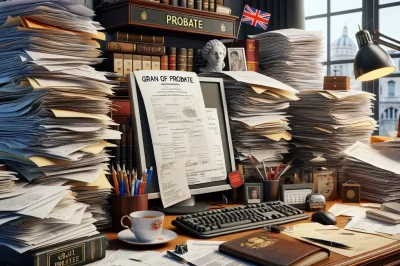Table of Contents

Most of us have heard about probate at some time or another, even if we don’t understand the actual process. In simple terms, probate is the legal procedure that your estate will go through once you have passed away. It is through probate that the distribution of your estate will be allocated to your chosen heirs.
Probate is much easier if you have a will in place which clearly outlines the specific wishes for your estate and with appointed executors (ie those who are responsible for executing your wishes). Even if you have a will in place, your estate must still go through probate but the process will be so much simpler than if you die intestate.
During the probate process, your will is authenticated and the legal advisor responsible for this process will authorise your executors to pay any debts and distribute your remaining property according to your instructions.
At Swansea Legal Solutions, we are often asked a lot of questions about probate and estate planning which we have answered here.
What is Probate and When Should it be Used?
Probate is a court-supervised process that authenticates your will, provided you have one, and approves your named executors so they can distribute your property and other assets. Once any outstanding taxes and debts are paid then the remaining value of the estate is distributed to your chosen beneficiaries.
If you die intestate (ie without a Will), then this process becomes far more complicated as there is no formal record of your final wishes. In this case, a court will be appointed to make these decisions.
Importantly, the more robust your estate planning has been, then the simpler the probate process will be, and in some instances can even be avoided. The most common approach to simplifying probate or even avoiding it can be achieved by creating a trust. In a nutshell, some assets and property in an estate will always go through probate, while others, like those in a trust, will not.
What is a Probate Court?
If you don’t have a will in place, your estate will go through probate court. The probate court will act in the following instances whether you have an estate plan in place or not:
- If a named beneficiary of the estate passes away before the giver and you don’t update your will, the court will become involved in deciding how to settle this part of your estate.
- Non-titled property, ie anything you own that doesn’t have associated paperwork, such as household appliance or furniture fore example, could go through probate court unless these items are specifically allocated through your will.
- If a property is held as “tenants in common,” and there aren’t clear instructions in a will, a probate court will step in to help determine how your share of the property is passed down. However, if your will makes your wishes clearly known, the process will be simplified.
Certain assets and property will not have to go through probate. By properly planning, you can help avoid probate for any of the following.
- Items which have been allocated to a specific beneficiary can avoid probate eg life insurance policies which have named beneficiaries.
- Items included in a Living Trust as, in this case, the trust owns the items so when you pass away these items go to the stated beneficiaries so avoiding the probate process.
What is involved in the Probate Process?
The probate process will depend on whether you have a will in place or not. The main difference is that if you die intestate, then the court will appoint someone as a Personal Representative to oversee distribution of your belongings. In the absence of a will. Once a representative has been appointed the probate process is same as if there was a will in place.
The main processes include:
- Informing the court of someone’s death by submitting a copy of a death certificate to start the probate process
- Having your will authenticated by the court to ensure it was properly signed and dated in accordance with the law and so making the will valid.
- Formal appointment of your named executor(s) to oversee the process and settle your estate. (As mentioned, if there is no will, the court will appoint a Personal Representative for this role).
- Informing beneficiaries and creditors of your death is the next step to be carried out by your executors as well as settling any outstanding debts. Provided there is a will in place, this process should be relatively simple though contacting creditors can be more difficult.
The value of your estate must then be determined through an assessment which takes into account everything you owned at the time of your passing. This process determines the value of your estate.
Distribution of remaining assets, usually after funeral costs have been paid, are then forwarded to the appropriate beneficiaries according to the wishes outlined in your will.
Swansea Legal Solutions
The probate process can be lengthy and complicated, especially during a time of grief and not something that you probably don’t want to go through alone.
That’s where the team at Swansea Legal Solutions come in. We offer support and guidance in all aspects of estate planning to make the probate process as smooth as possible for your executors and beneficiaries.
Call us today on the number below to book an appointment with our specialist team:
- Common Probate Problems in the UK and How to Avoid Family Disputes – 18 February 2026
- Can You Do Probate Yourself in the UK? Pros, Cons and Common Mistakes – 15 February 2026
- Probate Without a Will: What Happens When Someone Dies Intestate? – 12 February 2026







Leave a Reply
You must be logged in to post a comment.